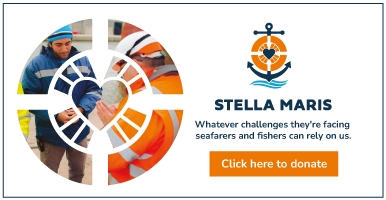Sorry, no records were found. Please adjust your search criteria and try again.
Sorry, unable to load the Maps API.
In his groundbreaking 2015 ecological encyclical Laudato Si’, Pope Francis devotes an entire section to the moral issues surrounding water, and in particular to the very basic human right of us all to have access to safe drinking water.
“Access to safe drinkable water is a basic and universal human right,” says Francis, “since it is essential to human survival and, as such, is a condition for the exercise of other human rights.”
Sadly, according the World Health Organisation, there are still around two billion of us around the world without access to safely managed drinking water services. Of those, 771 million cannot access even basic drinking water services – which is generally measured as water from improved sources with a round trip collection time of less than 30 minutes including queuing.
Although the problem is concentrated in sub–Saharan Africa, we’re finding increasingly that even the most developed Western nations are also finding themselves on the sharp end of a water crisis that’s growing at an alarming rate.
In America, for instance, it is estimated that some 45 million citizens are consuming unsafe water or have no running water access at all.
Just last month, amidst deepening public unease about water quality, the U.S. Environmental Protection Agency issued legally enforceable standards aimed at protecting people from exposure to carcinogenic polyfluoroalkyl substances, or so-called ‘forever chemicals’ in their water supply, which it is estimated are responsible for thousands of deaths and many hundreds of thousands of serious illnesses across the United States every year. Unfortunately, the new legislation only names six culpable substances out of a possible 15,000 known to have entered the US water chain at some time or another.
Between the extremes of Africa with its deadly deficit of water and the US with an equally deadly surfeit, there are numerous countries where the assumption of access to decent water is no longer able to be assumed as a given.
Here in the UK the seeds of the collapse of our water infrastructure were planted back in 1989 when the Thatcher government privatised water in England and Wales, making them the only two countries in the world with a fully privatised water network. The familiar mantra of privatisation was that it would encourage investment, increase efficiency and service, and lower bills. As an incentive the government wrote off huge water debts and allowed the new water companies to build absolute monopolies – unlike other utilities you have no choice about which water supplier you use.
Over the subsequent four decades investment by the water companies has shrunk by 15%, and they’ve built up a debt mountain of over £60 billion, for which we the taxpayers are liable. Executive salaries have reached into the annual millions – with the average CEO salary being £1.7m p.a. – and water company shareholders (the majority of whom are foreign corporate firms) have received nearly £80 billion in dividends, all paid for by us the taxpayer.
In terms of their responsibilities to this most vital of public infrastructures, water companies are currently leaking away 2.5 billion litres of water a day and are daily discharging raw sewage into our rivers more than 1,000 times a day, totalling more than nine million hours since 2016. Of course, if you listen to the water industry regulator Ofwat, water companies have stemmed water losses and kept bills low, while delivering “excellent quality drinking water and bathing water”. Yet in 2020 the UK was ranked last in Europe for bathing water quality, and our rivers were carrying dangerous amounts of chemicals and sewage.
However, with incidents like the greening of Lake Windermere and the very unpleasant cryptosporidiosis outbreak in Devon cause by a sewage leak this week, most people are by now reasonably aware that all is not exactly well with our waterways and drinking supply.
Oddly, given that the proper and responsible stewardship of our planet is one of the most fundamental lessons of the Book of Genesis, Christian theologians – and Catholics in particular – have been woefully slow in waking up to the growing planetary environmental crisis. The very fact that we all refer to Pope Francis Laudato Si’ encyclical as ‘groundbreaking’ or ‘landmark’ underscores our corporate deficit in this area. One of the most profound theological failings of the industrial era was misunderstanding that the biblical edict for Mankind to go out and subdue the planet and its resources meant we could also consume them without reserve, without moral examination. Throughout the Industrial Revolution and beyond Christendom seem gripped by the profound delusion that the more we consumed, the more God would provide – the notion of a finite planet and ecosystem never crossed our avaricious minds.
Those who did raise an early flag about unbridled consumption of planetary resources were largely dismissed as left-of-centre socialists, even in Christian circles, and the critically important concept of environmentalism has only recently entered the religious mainstream.
Although he’s not generally remembered for his empathies with planetary nature, Pope Paul VI was an early witness to the disastrous potential of environmental mismanagement. In a commendably visionary Apostolic Letter – Octogesima Adveniens – penned in May 1971, Paul warned: “Man is suddenly becoming aware that by an ill-considered exploitation of nature he risks destroying it and becoming in his turn the victim of this degradation. Not only is the material environment becoming a permanent menace – pollution and refuse, new illness and absolute destructive capacity – but the human framework is no longer under man’s control, thus creating an environment for tomorrow which may well be intolerable.”
Half a century later we’re getting perilously close to ‘intolerable’, especially when it comes to things as fundamental as access to safe drinking water. Sadly, it’s another aspect of the human condition that few people raise a shout until the tanks arrive on their own lawn, so it’s only just becoming a matter of grave concern (and a rising degree of panic) that something has gone fundamentally wrong not just with the human water supply, but with the streams, rivers and oceans upon which all life depends.
Certainly, over the next few decades, the existential threats that the human species will have to confront will only increase and a time will come sooner rather than later when the current narrative of Catholic social teaching will need to move from generalisations to specifics, from iterating general principles of goodwill to all Mankind to the far more direct challenging of institutions and mechanisms that are responsible for grave and potentially lethal environmental injustices.
The growing water crisis is a perfect case in point. The combination of corporate theft and incompetence, and climate change, is driving the UK towards a profound water supply crisis. We’ve experienced three major drought episodes since 2000 and it’s estimated that within the next 25 years England will be fundamentally unable to meet its water needs. Meanwhile Just Thames Water alone is losing a breathtaking 600 million litres of water a day. The numbers, the mismanagement and the huge profits are mind-boggling, and there’s neither the will nor the capacity within government to halt this looming catastrophe, which is not just about water, but the ‘pyramid of incompetence’ template that has worked its way throughout British endeavour like an unstoppable blight.
In the ‘pyramid of incompetence’ scenario, those fundamentally unsuited to positions of control gain positions of power and influence, and promote lesser replicants of themselves (as opposed to innovators), and thus management structures become inverse pyramids of ability, knowledge and decision-making intuition. It’s a culture that enhances the incompetent, and stifles the non-conformists and innovators who might just be the lateral thinkers who can identify crises before they occur, and often have the capacity to create the radical strategies needed to avoid disasters.
We have witnessed perfect examples of this reverse hierarchy in action in the ongoing Post Office debacle, and this week again in the dreadfully tragic and perfectly avoidable contaminated blood scandal.
This may sound like political radicalism, but it’s fundamentally an issue of proper stewardship that for those involved in Catholic social teaching reaches right back to the Hexaemeron.
In the case of the water crisis there’s a desperate need for proper stewardship, and it’s clear that this will neither come from the companies and their executives, nor from a government that has moved itself into an impotent position. What’s needed to solve the problem is direct public involvement, both in terms of pressurising the current hierarchies to behave in a way that’s consistent with the common good, but also in terms of opening up the industry to direct public involvement. In many respects water is a unique societal issue that moves decision-making beyond self-interest and firmly into the realm of the common good. None of us can survive without access to good, clean water.
There really is an urgent need for those of us to claim to be promulgators of Catholic social teaching to become directly involved in securing water security for society, in developing what is becoming known as water stewardship. (We have a model example of this already operating in The Emmaus Partnership, which is linked to the Diocese of Clifton, and is engaged with multi-level partners in an innovative supplying of vital water resources to villages in South West Uganda).
In another example over in California – which is currently experiencing its second extreme drought in the past decade – the California Water Action Collaborative – which includes Catholic stakeholders – is also linking together all the interested parties in water management and supply to create a concept of using water in a way which is socially responsible, sustainable and economically beneficial.
In other areas of Catholic of Catholic concern, such as education and medical ethics, we have been both radical and responsible in working with all levels of stakeholders to achieve socially beneficial outcomes – we now need to adopt the same societal activism in helping to resolve both our domestic – and the global – water supply and quality crisis.
Joseph Kelly is as Catholic writer and theologian
































